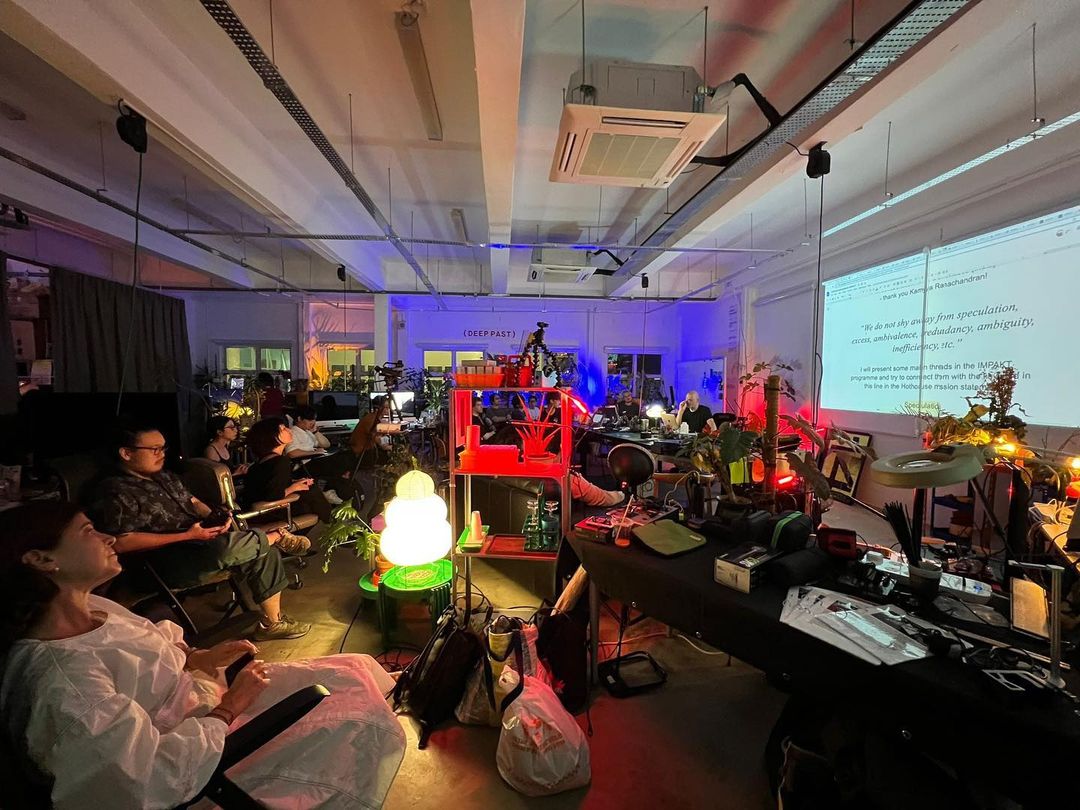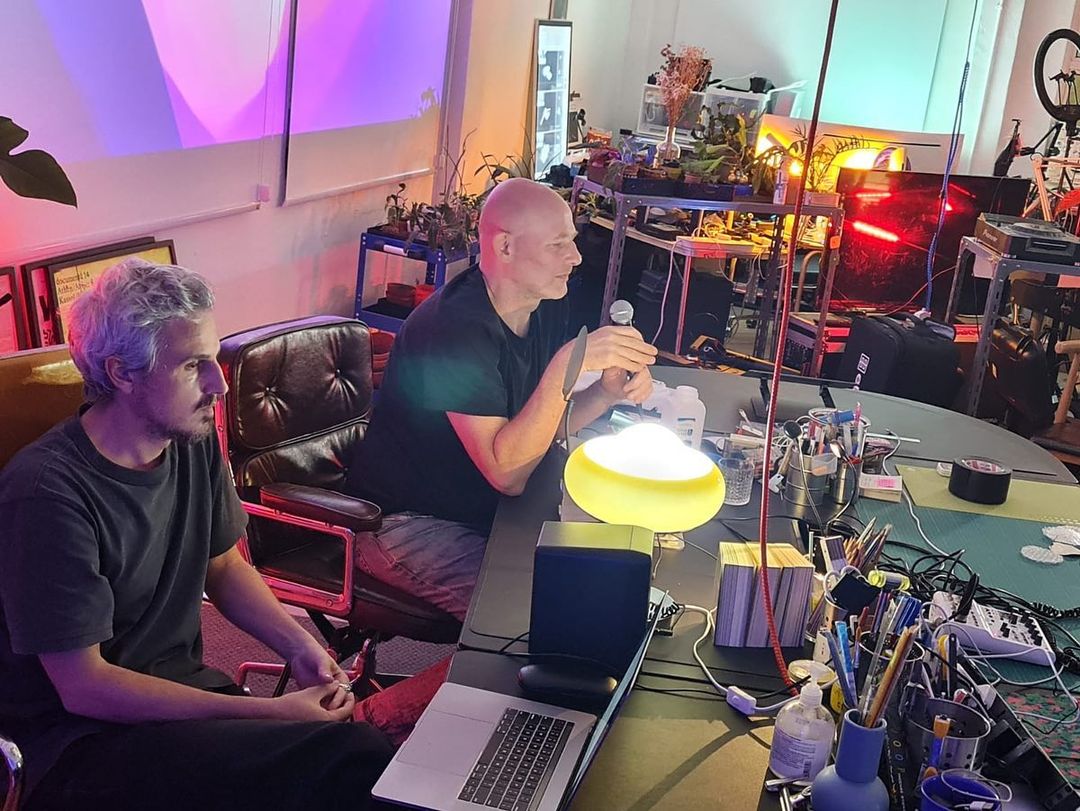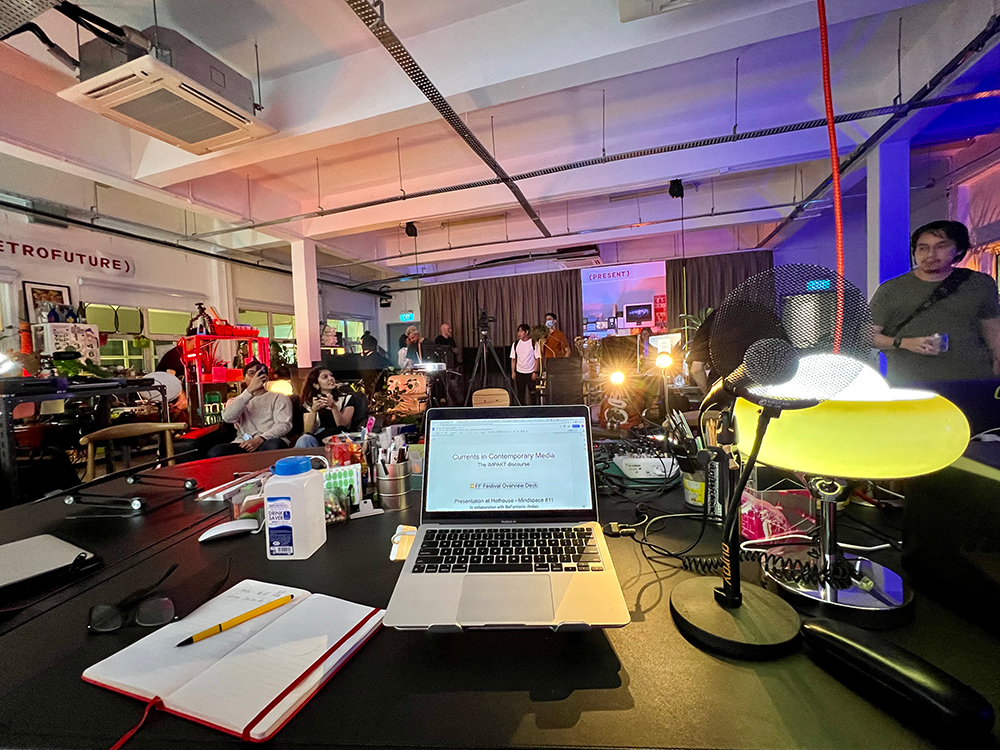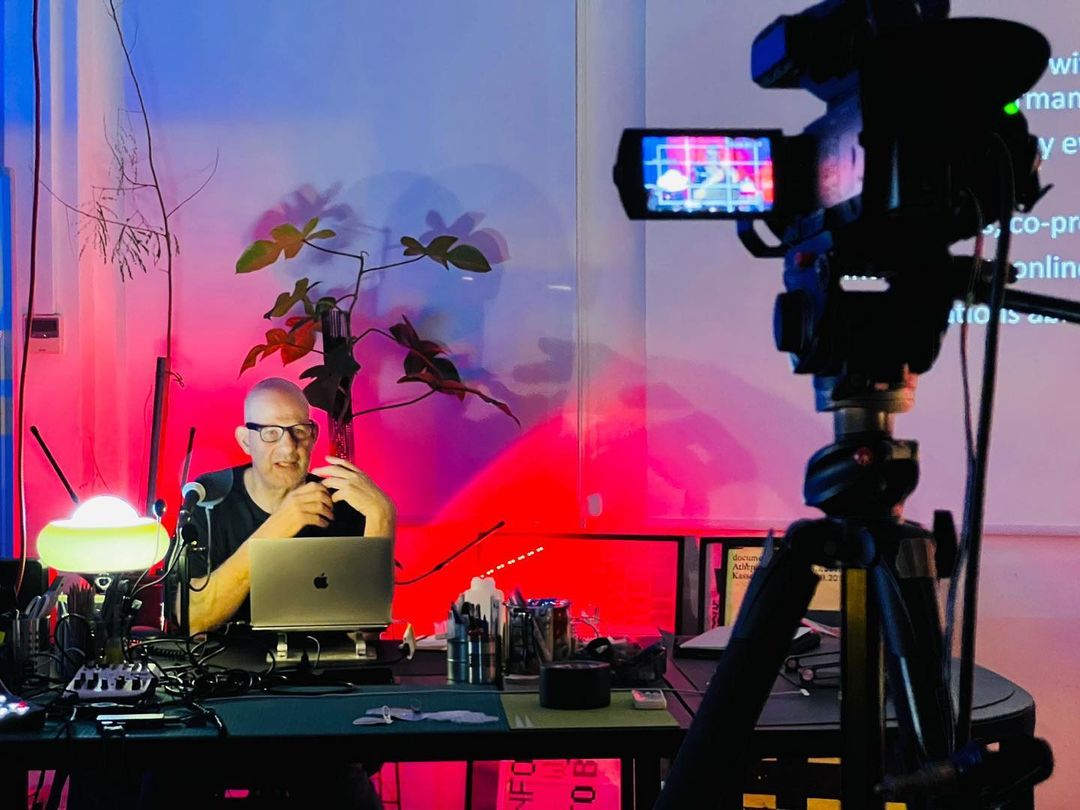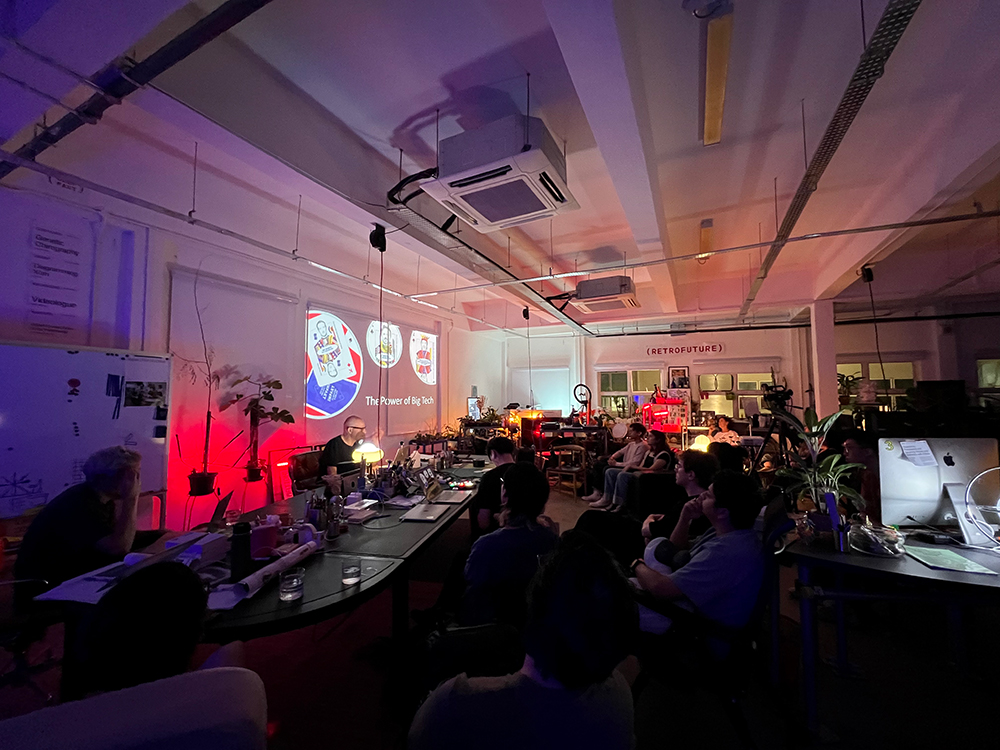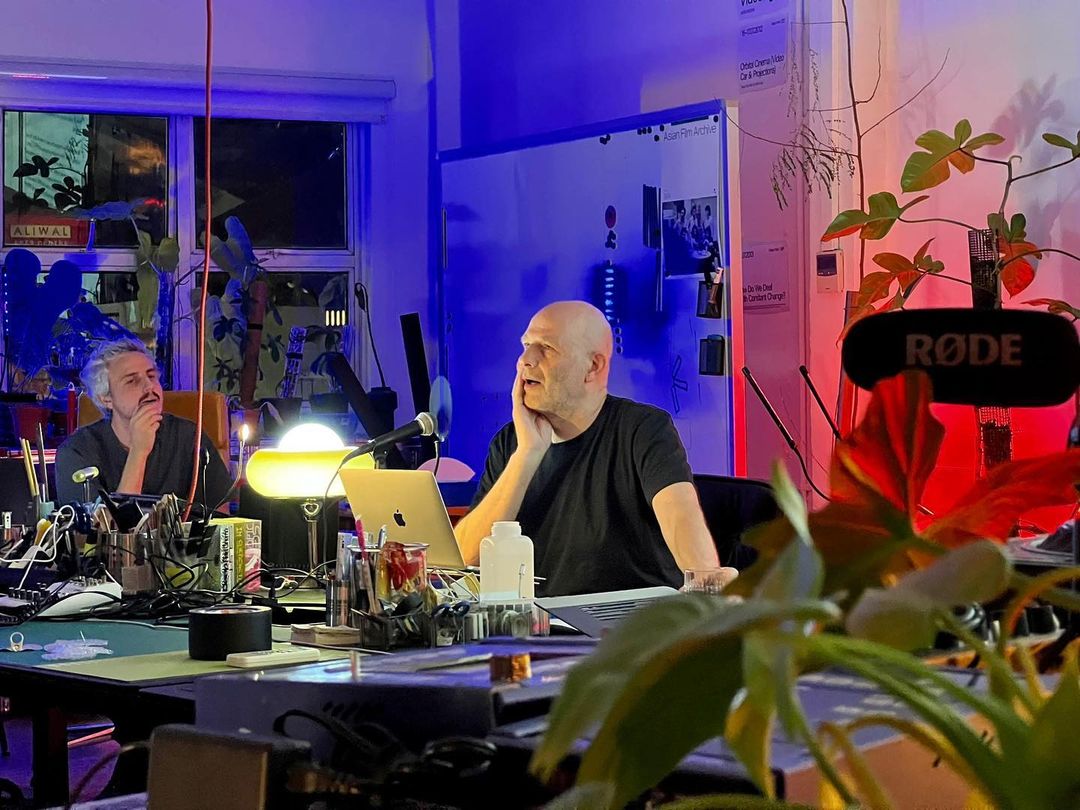Arjon Dunnewind (Mindspace+)
Thank you all who came to attend the talk! For those who missed, here are some impressions of Currents in Contemporary Media, a talk and Q&A with Arjon Dunnewind on 12 Dec 2022.
Mindspace+ is a new series that expands its horizons beyond the local to chart international conditions of media art.
[Followed by Federico Ruberto’s notes presented in the Q&A]
Futures
Thoughts on the state of media arts during/ after the pandemic
- collective experiences in virtual reality
- archiving and media art
Hybrid Wine Tasting
Impressions
Anecdotes and impressions on media art in Singapore / the region.
Transnational currents between Europe and Asia / Singapore
Criticality
"CODE, Reclaiming Digital agency"
is a project we have done now for two years, and the IMPAKT Festival 2023 will also deal with the topics
What can we say about
Art dealing with technology in Europe
Art dealing with technology in Asia
When looking at the (false?) dichotomies:
Utopian >< Dystopian
Techsolutionist >< Techcriticism
Technophilia >< Technophobia
It seems that Techcriticism is as mandatory in Europe as techsolutionist is dominant in Asia? Of course this is a grotesque generalization, but it could be the start of a discussion ….
Federico: CRITICALITY
CRITICALITY (>>> MAIN QUESTION: Thanks for the insightful and richly hyperlinked presentation, and for outlining the different threads and vectors that populated your vision and the work that is archived at Impakt’s website. Thanks for the amount of labour you have put throughput the years trying to maintain a critical discourse on media art and media discourse.
There are terms present in your presentation and in your website such as:
Modern love
Reclaiming agency
Soft Machine
Weird gnosis
We are data
Open source intelligence
Turning tables
Digital Agency
All these are calls for liberating alternative critical views, they raise awareness on how technology performs. Any of your slides could be taken as a departure point for further critical reflection. Let me try to formulate my question and the concerns we have at HH. Of course, I believe, we are all aligned with the mission of “turning tables”… the agency of disrupting current power structures… however there is a torsion that makes the act of “turning the tables” a complicated one. There’s a bi-polarity we need to reflect upon, a polarity present in your presentation, a polarity to grasp for us to be able to change existing media power-structures. It is perhaps a polarity I find when I look at the events organised at Impakt: a libidinal escape and an attempt to analyse (comprehend, rationalise…control).
Where do you position yourself and Impakt in such axis, where are you heading towards? Do you align more with the libidinal materialism of escape, a digital materials of the cypher and the glitch… or with the neo-rationalism crafting of planetary modes of sustenance and connection? This is a complicated question as it could lead in heated philosophical battles…In other words, do we escape platforms (blackholes) by rejecting technology or by transforming it, by augmenting ourselves through it? Shall we work on the subject’s liberation through refusal first or constructing collective structures where new subjects could be formed? Disruption or construction, subjective Escape or Collective consolidation?
Of course one could say both… but if you are to choose where would you put your labour in, at first: subjectivity (unconditional freedom of the subject) or collectivity (the necessity of taming one’s freedom for allowing that of others)? It seems that you are moving in the direction of promoting collective consolidation with your most recent work… could you expand a little on such question and where do you locate the agency for us to move forward given contemporary power-structures?
>>>SUB-QUESTION
And in relation to this, I would like you to expand on Dao: which in my view is a technology that is both, disrupting and constructive. How do you see the future in relation to blockchain?
F[ollowed by Federico Ruberto’s notes presented in the Q&A]
Utopian >< Dystopian
Techsolutionist >< Techcriticism
Technophilia >< Technophobia
Another interpretation of Ambivalence and Ambiguity is the privilege that art has over Academia, Science, Politics, Journalism. This is the privilege to be open for interpretation, subjective, leaving things to the imagination of the viewer, to be controversial, subversive and uncomfortable. These qualities of art are essential to IMPAKT. This is the “We aim to present creative and innovative approaches and stir debates with critical ideas on common beliefs in society at large as well as towards dominant perceptions in arts and academia.” in our mission statement and the “creative controversy” in my own bio.
Art the the agency of connecting, moving between fields, the power of inventing a language. Or the possibility of escaping given terms, frameworks and forced nominations.
From Stiegler, we remember this: “be[ing] entirely calculable by algorithms we reduced to nothing.”. (Bernard Stiegler, “Être entièrement calculable par des algorithmes nous réduit à rien” (14-06-2016)). In sum, given the conditions of the present “that’s what we’re interested in: revolutionary schisis as opposed to the despotic signifier.” (Gilles Deleuze, “Negotiations” (New York: Columbia University Press, 1995), p.24.), where (for E.Laclau) “an empty signifier is, strictly speaking, a signifier without a signified. This definition is also, however, the enunciation of a problem. For how would it be possible that a signifier is not attached to any signified and remains, nevertheless, an integral part of a system of signification? ... The only possibility for a stream of sounds being detached from any particular signified while still remaining a signifier is if, through the subversion of the sign which the possibility of an empty signifier involves, something is achieved which is internal to signification as such. What is this possibility?” (Ernesto Laclau, “Emancipation(s)” (London: Verso, 1996), p.36). In search for the non-signified in-betweenness…The slippery sign, the sign that does not belong, embracing the agency of “parasitical" practices (the “parasite” from Michel Serres, later on taken up by Matteo Pasquinelli).
[Followed by Federico Ruberto’s notes presented in the Q&A]
Weirdgnosis
From the occult rituals of witchcraft to esoteric psychedelia, the online exhibition Weird Gnosis takes you on a journey into some of the weirder parts of the web. As new media technologies appear increasingly indistinguishable from magic, the Internet is becoming a forum for the struggle between magickal subcultures – the ‘k’ differentiating it from rabbit-from-a-hat stage magic – who use the language of esoteric revelation and weird mediation. From ancient spiritual practices of divine self-knowledge – or gnosis – to the psychedelic drugs of contemporary cultic milieus, these technologies of the self can be conceptualised as both cure and poison – what the ancients called a pharmakon.
AMBIGUITY: The ability to find allies in the most understated grounds. The necessity of moving between orders of discourse to break away from pre-constituted identities, hegemonic-dogmatic frameworks-narratives. The desire to promote minoritarian practices (as per how Deleuze intended it) and alternative world-views (see the work of Shannen Mattern, who talks about the importance of indigenous cartographies…and that line of thought, herewith Tiqqun’s famous statement: “Rather than new critiques, new cartographies are what we need. Cartographies not for Empire, but for lines of flight out of it.”
[Followed by Federico Ruberto’s notes presented in the Q&A]
I’m curious how Hothouse interprets these qualities: excess, redundancy, inefficiency. I would like to connect them to a project we did on the main dogma’s that we could see as causes of the crises we are in at the moment:
Dogma 1
Technology and more technology is the solution for every problem
Dogma 2
For prosperity and a functioning economy we need permanent growth
A speculative attitude based on EXCESS - REDUNDANCY - INEFFICIENCY is to be considered, by default, a DISRUPTIVE one. Speculating is executed order to exit, in order to resist, to allow interstices for new modes of living and making. This mode has particular association to critical disruptive practices that started in the ’60 and that fuelled liberation through a post-structural discourse. However there are issues with proceeding in that direction… which is a direction that seems to celebrate solipsistic withdrawal and that is not able to articulate collective construction. Hence, the disrupting act must be followed up by a constructing attitude. Irrational drives and rational scaffolding thereafter…
[Followed by Federico Ruberto’s notes presented in the Q&A]
IMPAKT Festival 2022 The Curse of Smooth Operations
"Do you think technology is dissatisfying enough when it freezes, crashes or breaks down? There may be greater dissatisfaction in store for you.
What if the most dissatisfying technology of all is the one that works?
What is technology? Who or what informs our expectations of technology. Is technology the solution or the problem? Is technology a self driving force?
Do we animate technology or is technology animating us?
Do we control technology or is technology controlling us?
In his keynote Vladan Joler explained his assembly, his allegorical system on New Extractivism. It addresses the complex system of Platform Capitalism, Data Extraction and Digital Colonialism in which we are the resource, the product and the workers.
Extraction of Resource - Product - Labour
We are the resource, the product and the workers in this system
Constructing alternative modes breaking the habit, the default, the “given”, the stuff that generates a framework and through which existence gets played out passively, the stuff that is taken for granted.
Speculation is always accompanied to criticality. Critical “fictioning” - critical, a term which connects to one of your later points. With fictioning I have in mind the work of Laruelle and Deleuze. Or a more recent collection by David Burrows, Simon O'Sullivan, “Fictioning - The Myth-Functions of Contemporary Art and Philosophy”, where they state:
“Fictioning in art is an open-ended, experimental practice that involves performing, diagramming or assembling to create or anticipate new modes of existence.”
Fictioning and speculation, how to reply them which the risk of unfolding into dadaist absurdity. Critical-fiction as in science fiction, to be constructed collectively (side note, see Haraway - “SF: Science Fiction, Speculative Fabulation, String Figures, So Far”
Currents in Contemporary Media - The IMPAKT discourse
Presentation at Hothouse - Mindspace #11
In collaboration with BeFantastic (India)
- thank you Kamya Ramachandran!
“We do not shy away from speculation, excess, ambivalence, redundancy, ambiguity, inefficiency, etc.”
I will present some main threads in the IMPAKT programme and try to connect them with the keyword in this line in the Hothouse mission statement.
Speculation
Excess, redundancy, inefficiency
Ambiguity, ambivalence
Hybridity
Criticality
Agency
IMPAKT’s vision on Art, Media, Technology, society:
About IMPAKT | IMPAKT
We aim to present creative and innovative approaches and stir debates with critical ideas on common beliefs in society at large as well as towards dominant perceptions in arts and academia.
